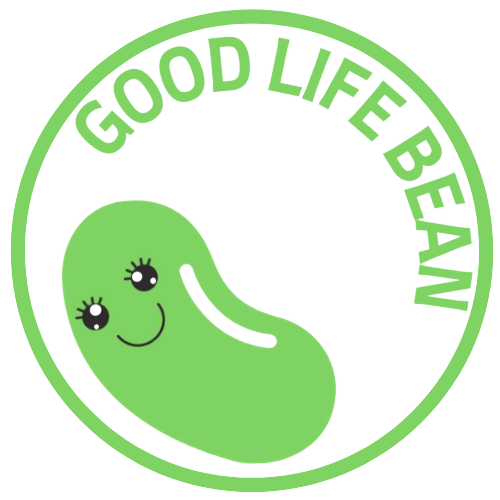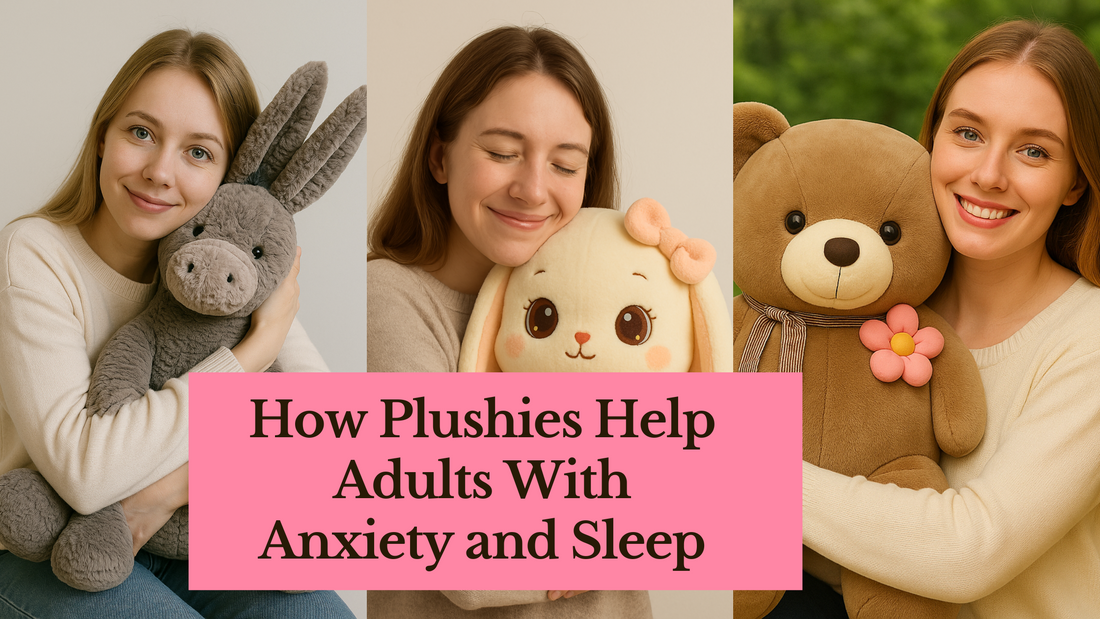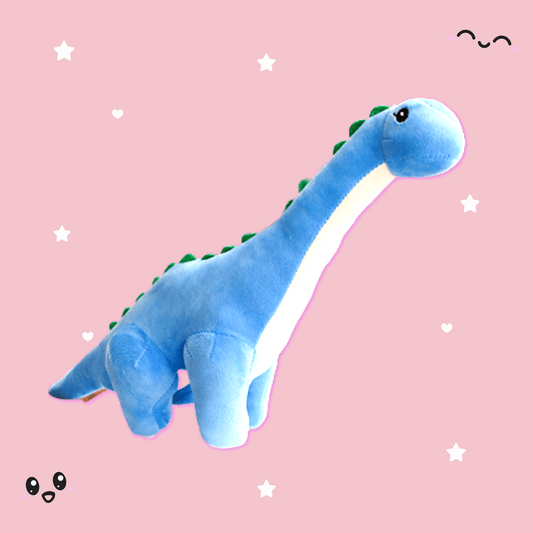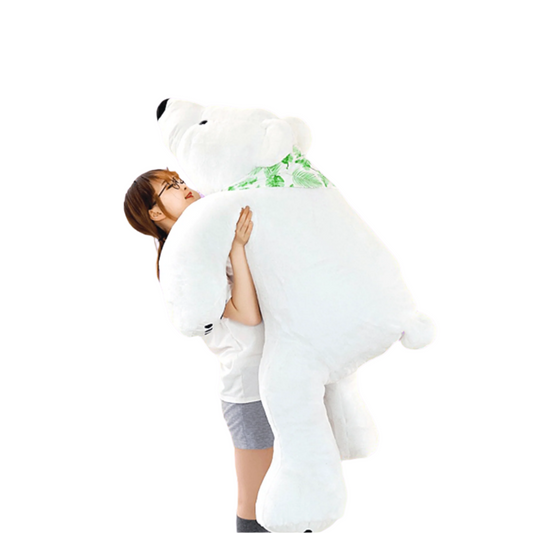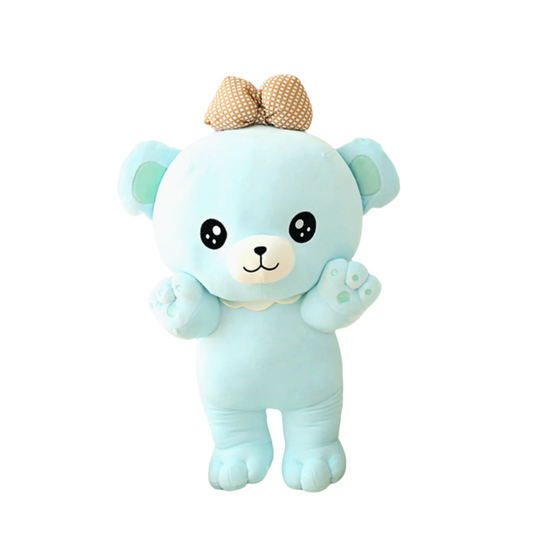In recent years, plush toys have transcended their traditional role as children's playthings to become essential tools in adult self-care routines. Particularly in 2025, there's a noticeable trend of adults turning to plushies—especially weighted and oversized varieties—to manage anxiety, stress, and sleep disturbances.
This shift is supported by research indicating that deep pressure stimulation (DPS) from weighted objects can trigger the release of calming neurotransmitters like serotonin and oxytocin, offering relief comparable to a soothing hug. Additionally, psychologists recognize stuffed animals as "transitional objects" that help bridge the gap between internal emotions and the external world, reducing feelings of loneliness and providing a safe outlet for emotional expression.
From TikTok trends showcasing plushie naptime hacks to clinical studies on sensory regulation, it's evident that plushies have become versatile tools for mental well-being.
Read: Feeling Anxious? These 10 Emotional Support Plushies Will Help
The Science Behind Plushies and Mental Health
Deep Pressure Stimulation (DPS) and Anxiety Reduction
Weighted plushies apply gentle, even pressure across the body, a technique known as deep pressure stimulation. This method is widely used in occupational therapy and has been shown to decrease cortisol levels, the body's primary stress hormone. Studies indicate that DPS can promote relaxation and alleviate anxiety symptoms in both children and adults.
Oxytocin Release and Emotional Comfort
Physical touch, even with inanimate objects, can stimulate the release of oxytocin, often referred to as the "cuddle hormone." Hugging or holding a soft plushie replicates this effect, creating a non-judgmental source of comfort during stressful moments.
Transitional Objects and Nostalgia
First identified by pediatrician D.W. Winnicott, "transitional objects" like stuffed animals serve as emotional stand-ins during periods of change or stress. For many adults, their childhood plush remains a tangible link to safety and security, easing separation anxiety and fostering emotional resilience.
Must Read: BEST Plushies to Hug if You're Going Through Something
Practical Applications of Plushies in Daily Life
Instant Soothing Sensation
Cuddling a plushie provides a tactile distraction from racing thoughts. The soft texture and gentle weight redirect focus to the present moment, interrupting cycles of worry.
Portable Coping Tool
Unlike therapy pets or gadgets, plushies are lightweight, affordable, and require no maintenance. Slip a small weighted plush into your bag for discreet support during commutes or public speaking engagements.
Sensory Regulation for Neurodivergent Adults
Individuals with ADHD or autism spectrum conditions often benefit from sensory input. The consistent pressure of a weighted plush helps regulate sensory overload, improving focus and reducing anxiety spikes.
Incorporating Plushies into Stress Relief Routines
Mindful Breaks with Your Plushie
Take a 5-minute "plushie pause": sit comfortably, hug your toy close, and practice deep breathing. Research shows even brief DPS sessions can lower heart rate and promote calm.
Desk Buddies and Work Stress
Keep a small, soothing plushie at your workspace. Stroking its fur during tense calls or deadlines can buffer the impact of chronic work stress and reduce mental fatigue.
Creative Expression and Play
Designating your plushie a "character" and engaging in light-hearted play or journaling prompts can unlock playful creativity and diffuse stress through laughter and imagination.
Plushies as Sleep Aids
Weighted Body Pillow Plushies
Giant plushies or body-pillow designs combine DPS with full-body support, aiding insomnia by easing physical tension and signaling the body to relax.
Routine Reinforcement
Incorporate your plushie into a nightly wind-down routine—dim lights, gentle music, and a brief cuddle session—to create consistent sleep cues and improve sleep onset latency.
Alternatives to Weighted Blankets
For those who find blankets too restrictive, a weighted plushie offers similar benefits without covering the entire body, making it ideal for side sleepers or restless movers.
Addressing Common Challenges and Care Tips
Space Constraints
Problem: Large plushies can overwhelm small living spaces.
Solution: Opt for mid-size or collapsible designs when space is tight, or use wall hooks to display rather than floor storage.
Cleaning and Maintenance
Problem: Dust accumulation and stains can pose health risks.
Solution:
- Vacuum weekly: Use a brush attachment to remove dust.
- Spot clean: Apply mild detergent and water sparingly; let air dry thoroughly.
- Washing guidelines: If machine-washable, enclose the plushie in a laundry bag on a gentle cycle; otherwise, consider professional cleaning.
Allergen Considerations
Problem: Plushies can harbor dust mites and allergens.
Solution: Choose hypoallergenic materials and sun-dry occasionally to reduce microbial growth.
Must Read: Can Plushies Help With ADHD?
Frequently Asked Questions (FAQs)
Q1: Are weighted plushies safe for everyone?
A: Generally yes for adults; however, those with circulatory issues or sensitivity to pressure should consult a healthcare provider before use.
Q2: How heavy should a weighted plushie be?
A: Experts recommend 5–10% of your body weight to maximize DPS benefits without discomfort.
Q3: Can non-weighted plushies still help?
A: Absolutely—any soft, familiar object can trigger oxytocin release and offer tactile comfort.
Q4: How often should I wash my plushie?
A: Lightly vacuum or spot-clean every 1–2 weeks; full washes every 3–6 months depending on use and environment.
Conclusion: Embracing Plushies for Mental Well-Being
Plushies have evolved far beyond childhood nostalgia; they're now recognized tools for managing anxiety, reducing stress, and improving sleep. By integrating them thoughtfully—whether as weighted companions, desk buddies, or bedtime partners—you can harness the science of touch and transitional comfort to enhance your mental well-being.
Explore curated plushie collections to find your next huggable ally in self-care.
